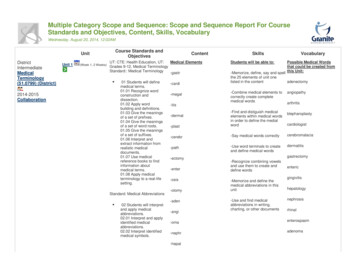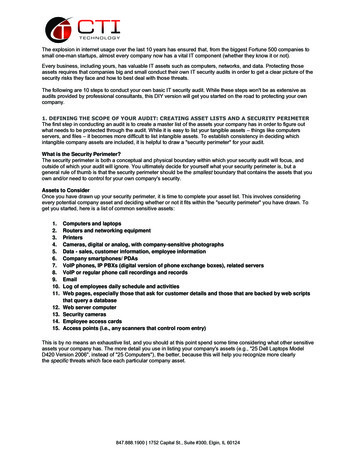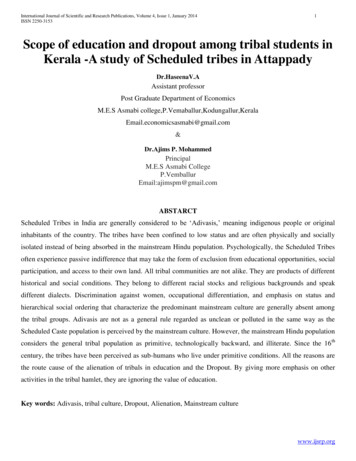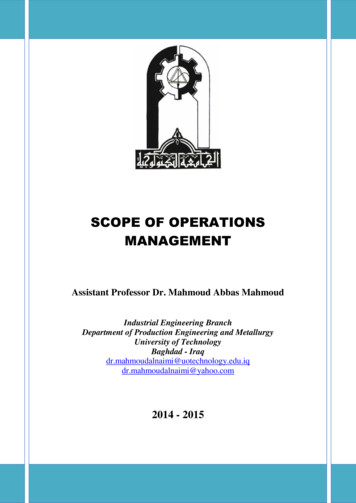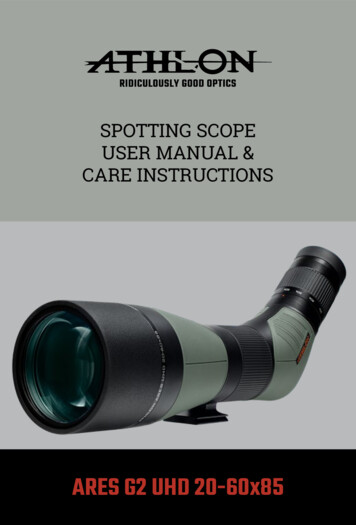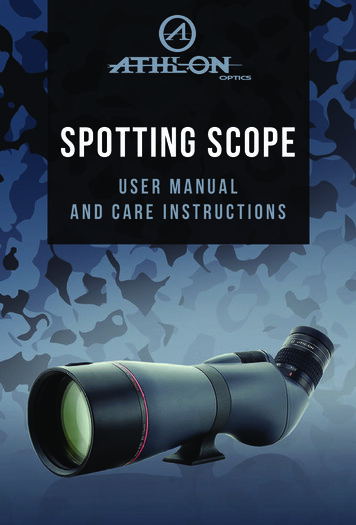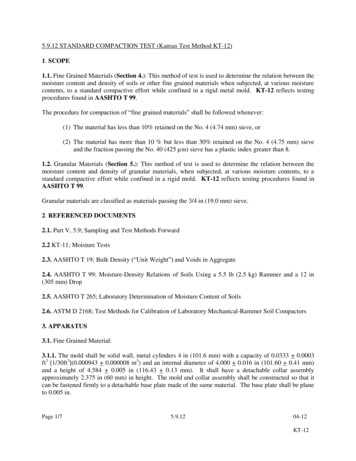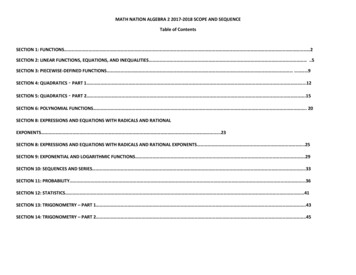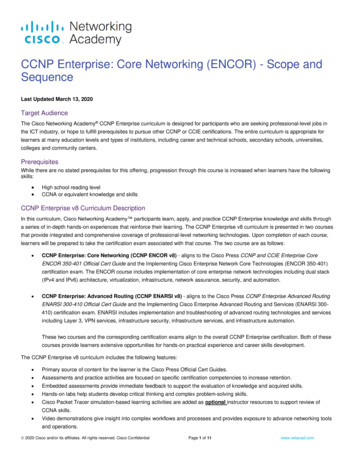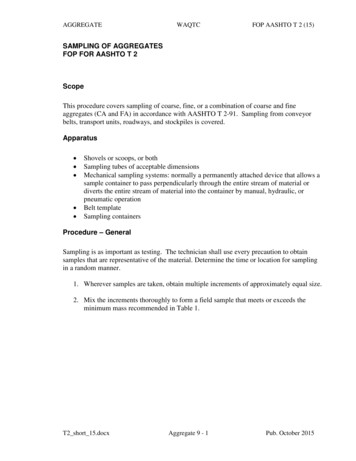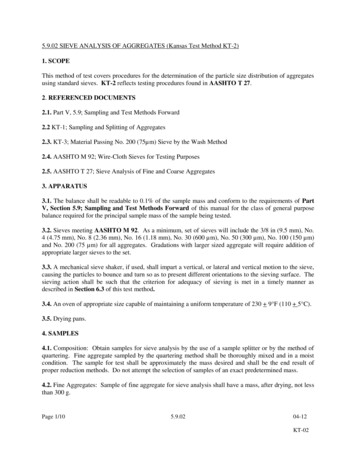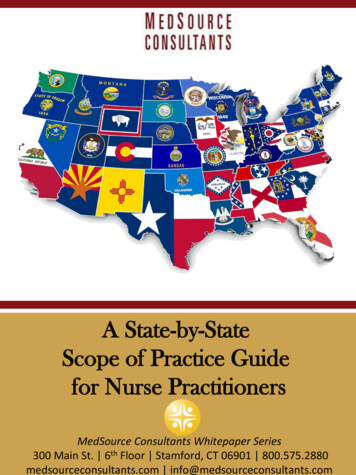
Transcription
A State-by-StateScope of Practice Guidefor Nurse PractitionersMedSource Consultants Whitepaper Series300 Main St. 6th Floor Stamford, CT 06901 800.575.2880medsourceconsultants.com info@medsourceconsultants.com
In 2017, over 20 states passed legislation that positively impacted access to and delivery ofhealthcare to patients nationwide.Signature authority: Six states enacted legislation pertaining to full or partial global and partial signature recognition andauthority, including APRN authorization for certain aspects of care. Global signature authority is generally defined asauthorization for recognized APRNs to sign, certify, or endorse all documents related to healthcare within their scope ofpractice (SOP) provided for their patients. Some states limit these documents (partial) to a statutorily authorized list, whileothers are broader in their approach.APRN authority to sign death certificates among other documents is particularly important and was accomplished inArkansas (Act 372; enacted March 2017), Minnesota (HF 2177; effective May 2017), Nevada (Chapter 318; effectiveJanuary 2018), Texas (SB 919; effective June 2017), and Wyoming (Chapter 160; effective March 2017). North Carolina(Act 2017-111; effective July 2017) enacted legislation adding NPs to the list of providers authorized to sign handicapparking certificates.Recommendation for medical marijuana use: The District of Columbia joins Connecticut, Hawaii, Maryland, Maine, andNew York as states/districts that authorize APRNs as providers who may recommend the use of medical marijuana to aqualifying patient with a qualifying medical condition as described. Act 21-565, Medical Marijuana Omnibus AmendmentAct of 2016, was issued December 16, 2016. This authority does not confer prescriptive authority as marijuana is listedas a Schedule I controlled substance by the Drug Enforcement Administration (DEA). Designated APRNs in these stateshave authority to recommend the use of this substance as described by each state's law.Introductionwww.medsourceconsultants.com
Source:State Nurse State Practice ActsAnd Administration Rules, 2017 American Association of Nurse Practitioners, 2017www.medsourceconsultants.com
AlabamaAlabama is a reduced practice state that is regulated by the state Board of Nursing andBoard of Medical Examiners.Licensure Requirements: RN license, graduate degree and national certification.Practice Authority: Must have collaborative agreement with PhysicianPrescriptive Authority: CRNPs and CNMs may prescribe, administer, and providetherapeutic tests and drugs within a BON- and BOME-approved formulary. CRNPs andCNMs in collaborative practice with a physician may prescribe controlled substances inSchedules III, IV, and V pursuant to the rules of the Alabama BOME Chapter 540-X-18.CRNPs and CNMs are required to complete 12 continuing medical education contacthours in advanced pharmacology and prescribing trends and 4 additional contact hoursevery 2 years for renewal of the Qualified Alabama Controlled Substances Certificateunder current regulation for Schedule III-V controlled substance authority.This state allows nurse practitioners prescriptive authority for drugs falling into schedule II, III,IV or V.1www.medsourceconsultants.com
AlaskaAlaska is a full practice state that is regulated by the state Board of Nursing.Licensure Requirements: RN license, graduate degree, national certification and a consultationand referral plan.Practice Authority: Full Independent Practice.Prescriptive Authority: Authorized APRNs have independent Rx authority—including SchedulesII-V controlled substances—and may apply for DEA registration. APRNs are legally required toreview the Prescription Drug Monitoring Program database prior to prescribing controlledsubstances. They are legally authorized to request, receive, and dispense pharmaceuticalsamples in Alaska. Prescriptions are labeled with the APRN's name only. To renew Rxauthority, APRNs must complete 12 contact hours of continuing education (CE) in advancedpharmacotherapeutics, including 2 CE hours in opioid prescribing each 2-year renewal cycle.This state allows nurse practitioners prescriptive authority for drugs falling into schedule II, III,IV or V.2www.medsourceconsultants.com
ArizonaArizona is a full practice state that is regulated by the state Board of Nursing.Licensure Requirements: RN license, graduate degree and national certification.Practice Authority: No formal physician collaboration agreement required. However, ArizonaDepartment of Health regulations require that patients admitted to an acute care facility musthave an attending physician.Prescriptive Authority: NPs have full Rx and dispensing authority, including controlledsubstances Schedules II-V, on application, and fulfillment of BON-established criteria. The Boardof Nursing allows an NP to prescribe and dispense drugs and devices within the NP’s populationfocus (e.g. family-individual across life span, adult-gerontology primary or acute care, neonatal).An NP may also prescribe Schedules II-V controlled substances. Ariz. Admin. Code §4-19-511,Ariz. Admin. Code §5-19-512.This state allows nurse practitioners prescriptive authority for drugs falling into schedule II, III,IV or V.3www.medsourceconsultants.com
ArkansasArkansas is a reduced practice state that is regulated by the state Board of Nursing.Licensure requirements : RN license, graduate degree and national certification.Legal Authority: No collaborative practice agreement required for APRNs. RNPs must practice inaccordance with protocols developed in collaboration with a practicing physician.Prescriptive Authority: The NPA authorizes the BON to provide a certificate of Rx authority toqualified APRNs. A collaborative practice agreement with a practicing physician (who hastraining in scope, specialty, or expertise to that of the APRN and use of Rx protocols) is required.APRNs with Rx authority may apply for and hold a DEA number. The NPA limits the prescribing ofcontrolled substances to Schedules III-V and hydrocodone-combination products from Schedule IIof the Controlled Substance Act (with authorization from the physician on the collaborativepractice agreement). Neither protocols nor collaborative practice agreements with a physicianare required unless the APRN has Rx authority.This state allows nurse practitioners prescriptive authority for drugs falling into schedule III, IV orV.4www.medsourceconsultants.com
CaliforniaCalifornia is a restricted practice state that is regulated by the state Board of RegisteredNursing.Licensure Requirements : RN license and a graduate degree.Practice Authority: Nurse practitioners and physicians must enter a collaborative agreement forone or more elements of NP practice. Currently in 2018, California state has found themselvesentrenched in unsuccessful lobbying efforts to enhance the role of NPs.Prescriptive Authority: Drugs or devices prescribed by the NP must be ordered in accordancewith the policies and protocols set forth in the agreement with the supervising physician. TheNP may prescribe drugs and devices within the NP’s area of practice. Physician involvement isrequired when the NP is prescribing Schedule II or III controlled substances, and a patientspecific protocol is required. Cal. Bus. & Prof. Code §2836.1This state allows nurse practitioners prescriptive authority for drugs falling into schedule II, III,IV or V.5www.medsourceconsultants.com
ColoradoColorado is a full practice state that is regulated by the state Board of Nursing.Licensure requirements include: RN license, graduate degree and national certification.Practice Authority: A nurse practitioner can evaluate and diagnose patients, order and interpretdiagnostic tests and initiate and manage treatments, including the power to prescribemedication. APNs must complete a 1,000-hour documented prescribing mentorship period(provisional Rx authority) with a physician or an APRN and registration with the DEA.Prescriptive Authority: An NP is authorized by the State Board of Nursing to prescribe drugsafter certain requirements are met, including educational classes and a preceptorship. Uponconclusion of meeting the requirements, provisional authority may be granted and the NP mayprescribe drugs and Schedule II-V controlled substances. A mentorship with a physician or NPwith full prescriptive authority must be completed within three years after receiving provisionalauthority. An articulated plan for safe prescribing must also be developed in the mentorship.Colo. Rev. Stat. §12-38-111.6, Colo. Board of Nursing Rules Chapter 15.This state allows nurse practitioners prescriptive authority for drugs falling into schedule II, III,IV or V.6www.medsourceconsultants.com
ConnecticutConnecticut is a full practice state that is regulated by the state Board of Nursing.Licensure Requirements: RN license, graduate degree and national certification.Practice Authority: NPs practice under the licensure authority of the State Board of Nursing instead of alicensed physician. For the first three years after initial licensure, the NP must collaborate with aphysician.Prescriptive authority: Full prescriptive authority is given with licensure and after 3 years and no lessthan a 2,000-hours of collaborative practice under a physician. APRNs and CNMs are legally authorizedto request, receive, and dispense pharmaceutical samples. The collaboration must include a method toreview patient outcomes. After three years, the NP may prescribe independently. Conn. Gen. Stat.§20-87a(3).This state allows nurse practitioners prescriptive authority for drugs falling into schedule II, III, IV or V.7www.medsourceconsultants.com
DelawareDelaware is a full practice state that is regulated by the state Board of Nursing.Licensure Requirements: RN license, graduate degree and national certification.Practice Authority: Full independent practice authority granted after two years of practiceunder a collaborative agreement with a physician.Prescriptive Authority: APRNs may apply for independent practice after successfully practicingunder a collaborative agreement within a hospital or integrated clinical setting (between aphysician, podiatrist, or licensed Delaware healthcare delivery system and an APRN) for atleast 2 years and a minimum of 4,000 full-time hours. APRNs licensed by the BON mayprescribe, order, procure, administer, store, dispense, and furnish OTC, legend, and controlledsubstances pursuant to applicable state and federal laws and within the APRN's role andpopulation focus.This state allows nurse practitioners prescriptive authority for drugs falling into schedule II, III,IV or V.8www.medsourceconsultants.com
District ofColumbiaWashington, D.C. is a full practice district that is regulated by the state Board of Nursing.Licensure requirements include: RN license, graduate degree and national certification.Practice Authority: Full independent practice authority.Prescriptive Authority: In the District of Columbia, a nurse practitioner can evaluate anddiagnose patients, order and interpret diagnostic tests and initiate and manage treatments,including the power to prescribe medications. APRNs must hold DEA registration.This state allows nurse practitioners prescriptive authority for drugs falling into schedule II, III,IV or V.9www.medsourceconsultants.com
FloridaFlorida is a restricted practice state that is regulated by the state Board of Nursing and Boardof Medicine.Licensure requirements: RN license, graduate degree and national certification.Practice Authority: A written protocol between an NP and the supervising physician is required.Prescriptive Authority: In Florida nurse practitioners must be supervised by a physician toprovide patient care and write prescriptions. Master's- or doctoral degree-prepared ARNPs areauthorized by supervisory protocol to prescribe, dispense, administer, or order any drug,including Schedules II-V controlled substances as authorized in a BON-adopted controlledsubstances formulary with certain exceptions. Additionally, psychiatric mental health boardcertified ARNPs may prescribe psychotropic controlled substances.This state allows nurse practitioners prescriptive authority for drugs falling into schedule II, III,IV or V.10www.medsourceconsultants.com
GeorgiaGeorgia is a restricted practice state that is regulated by the state Board of Nursing and theComposite Medical Board.Licensure Requirements include: RN license, graduate degree and national certification.Practice Authority: A written protocol is required between the NP and the supervising physician.Prescriptive Authority: NPs and their physician supervisors must work together under a written"nurse protocol". The nurse protocol is a written document in which the physician gives the NPauthority to perform medical acts and also agrees to be available for immediate consultationwith the nurse practitioner.This state allows nurse practitioners prescriptive authority for drugs falling into schedule III, IVand V.11www.medsourceconsultants.com
HawaiiHawaii is a full practice state that is regulated by the state Board of Nursing.Licensure Requirements: RN license, graduate degree and national certification.Practice Authority: NPs may practice independently from physicians and practice underlicensure authority of the State Board of Nursing.Prescriptive Authority: NPs are recognized in state policy as primary care providers. In Hawaii,the BON regulates APRN Rx authority, and APRNs have legal authority to prescribemedications, including Schedules II-V controlled substances independently pursuant to anexclusionary formulary established by the BON. APRNs with Rx authority are legally authorizedto request, receive, and dispense manufacturers' prepackaged pharmaceutical samples.APRNs may not request, receive, or sign for controlled substance samples; however, they mayprescribe, order, and dispense medical devices and equipment.This state allows nurse practitioners prescriptive authority for drugs falling into schedule II, III,IV or V.12www.medsourceconsultants.com
IdahoIdaho is a full practice state that is regulated by the state Board of Nursing.Licensure Requirements: RN license, graduate degree and national certification.Practice Authority: An NP is a licensed independent practitioner who shall practice consistentwith the definition of advanced practice registered nursing, recognized national standards, andthe standards set forth by the Board of Nursing rules.Prescriptive Authority: NPs are recognized in state policy as primary care providers. Apopulation focus is the section of the population which the NP has targeted to practice within.The categories of population focuses are family/individual across the life span, adultgerontology, women’s health/gender-related, neonatal, pediatrics and psychiatric-mentalhealth. Idaho Admin. Code §23.01.01.271.14.This state allows nurse practitioners prescriptive authority for drugs falling into schedule II, III,IV or V.13www.medsourceconsultants.com
IllinoisIllinois is a reduced practice state that is regulated by the state Board of Examiners forNursing.Licensure Requirements: RN license, graduate degree and national certification.Practice Authority: In Illinois, a collaborative agreement is required for all clinical practice,except for practice within a hospital or ambulatory surgical treatment center.Prescriptive Authority: An NP’s prescriptive authority must be outlined in the collaborativeagreement. NPs may prescribe prescription drugs and Schedules III-V controlled substances.Schedule II controlled substances may be prescribed if delegated by the supervising physicianand if certain requirements outlined in the rules are met. 225 ILCS §65/65-40.This state allows nurse practitioners prescriptive authority for drugs falling into schedule II, III,IV or V.14www.medsourceconsultants.com
IndianaIndiana is a reduced practice state that is regulated by the state Board of Nursing.Licensure Requirements: RN license and completion of graduate degree or RN license andcompletion of NP certificate program along with national certification.Practice Authority: In Indiana, nurse practitioners are required to establish a collaborativeagreement with a physician in order to practice and prescribe medication.Prescriptive Authority: An NP may prescribe prescription drugs and Schedules II-V controlledsubstances if outlined in the written collaboration agreement and after certain requirements aremet. 848 IAC §5-1-1.This state allows nurse practitioners prescriptive authority for drugs falling into schedule II, III,IV or V.15www.medsourceconsultants.com
IowaIowa is a full practice state that is regulated by the state Board of Nursing.Licensure Requirements: RN license, graduate degree and national certification.Practice Authority: NPs have full independent practice authority.Prescriptive Authority: Authorized ARNPs are granted full, independent Rx authority within theirspecific role and population focus, including Schedules II-V controlled substances. ARNPs mayprescribe, deliver, distribute, or dispense noncontrolled and controlled drugs, devices, andmedical gases, including pharmaceutical samples. ARNPs must register with the DEA, andprescriptions written by ARNPs must be labeled with their name.This state allows nurse practitioners prescriptive authority for drugs falling into schedule II, III,IV or V.16www.medsourceconsultants.com
KansasKansas is a reduced practice state that is regulated by the state Board of Nursing.Licensure Requirements: RN license, graduate degree and national certification.Practice Authority: In Kansas, nurse practitioners are required to establish a collaborativeagreement/written protocol with a responsible physician.Prescriptive Authority: APRNs, with the exception of CRNAs, are legally authorized to prescribemedications, including Schedules II-V controlled substances pursuant to a collaborativepractice agreement and written protocol.This state allows nurse practitioners prescriptive authority for drugs falling into schedule II, III,IV or V.17www.medsourceconsultants.com
KentuckyKentucky is a reduced practice state that is regulated by the state Board of Nursing.Licensure Requirements include: RN license, graduate degree and national certification.Practice Authority: The NP is required to have a collaborative agreement with a supervisingphysician for prescribing medications.Prescriptive Authority: An NP may prescribe legend drugs under a collaborative agreement witha physician. If an NP has met certain requirements after four years, the NP may prescribe drugsindependently. If the NP wishes to prescribe Schedule II-V controlled substances, thecollaborative agreement must remain in place. Ky. Rev. Stat. §314.042.This state allows nurse practitioners prescriptive authority for drugs falling into schedule II, III, IVor V.18www.medsourceconsultants.com
LouisianaLouisiana is a reduced practice state that is regulated by the state Board of Nursing.Licensure Requirements: RN license, graduate degree and national certification.Practice Authority: A collaborative practice agreement is required and includes parametersagreed upon by the NP and the supervising physician.Prescriptive Authority: APRNs have Rx authority in Louisiana, including Schedules II-V controlledsubstances. The BON has sole authority to develop, adapt, and revise R&R governing SOP,including Rx authority, the receipt and distribution of sample and prepackaged drugs, andprescribing legend and controlled drugs. An APRN who is granted limited Rx authority mayrequest approval to prescribe and distribute controlled substances as authorized by the APRN'scollaborating physician if the patient population is served by the collaborative practice.This state allows nurse practitioners prescriptive authority for drugs falling into schedule III, IVand V.19www.medsourcec
every 2 years for renewal of the Qualified Alabama Controlled Substances Certificate under current regulation for Schedule III-V controlled substance authority. This state allows nurse practitioners prescriptive authority for
